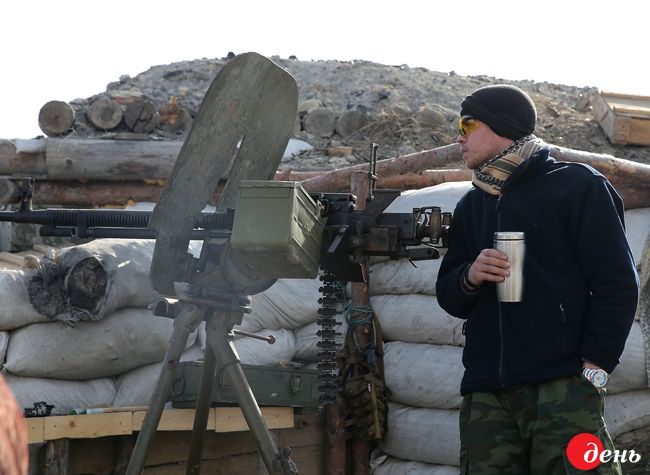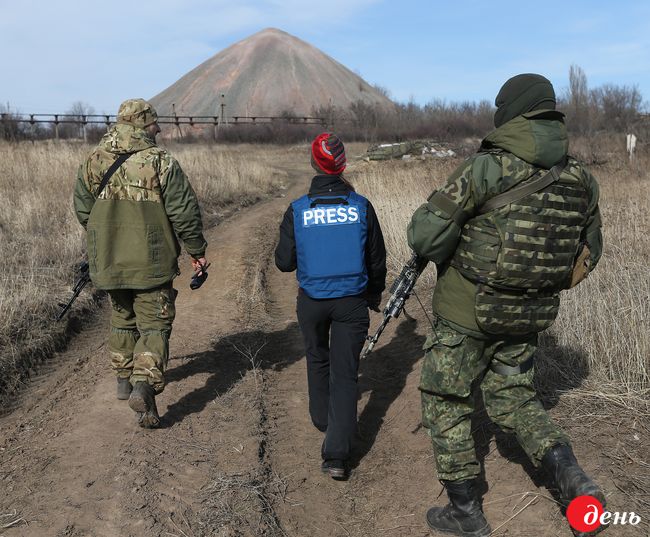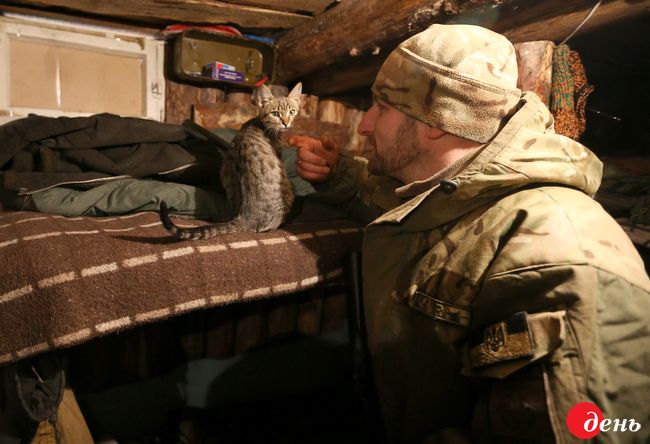On the line
Journalists of Den/The Day visit a Ukrainian checkpoint in the environs of Dzerzhynsk – two kilometers away from Horlivka occupied by terrorists
It is sunny. The wind is raising the dust. Last year’s red grass peeps in the places where snow has melt. A worker is mending a rusty pipe, the birds are chirping. It is the end of February, but spring has already come to the Donbas steppe. At first you would not even say that this is a frontline. Horlivka occupied by the DNR is located two kilometers away. Ukrainian servicemen have been guarding the checkpoint near Dzerzhynsk for several months. At the moment the soldiers from the 17th battalion of the territorial defense of Kirovohrad oblast are on duty. They are helped by the members of battalion “Peacekeeper” that is stationed in Dzerzhynsk. The task of the servicemen is to prevent the enemy from breaking through.
“It is the first day after ceasefire when it is silence. Before that we have had combats every day for a week. Recently the enemy was firing at us from small arms and mortars,” says a Kirovohrad battalion soldier with a callsign Cat. “What peace? We had not had any injured before the ceasefire began. And last week two of my people were wounded. We used to keep the enemy at the distance of three kilometers. After the ceasefire they are firing at us from a kilometer distance.”

HOT TEA AND AN OLD MACHINE GUN – WORK AND REST ARE NEXT TO EACH OTHER ON THE FRONTLINE
Cat has stayed near Dzerzhynsk for two months. Before that he had served for as long as that in Luhansk oblast. “Like Lenin said, the best rest is the change of occupation,” the serviceman jokes about his “rotation.” Cat shows the machine gun aimed at the positions of snipers and mortar men of the enemy. The machine gun was produced in the 1940s. This is a heritage of the Soviet army. “It functions well. But there are better than this one,” notes the serviceman.
The servicemen live in dug-outs several people in each. It is clean and warm inside – the dug-outs were heated in winter up to 27 degrees. Sometimes they are bothered by mice. The cat Sepa who was born here in summer and is absolutely not afraid of shelling is fighting the mice. In the field conditions the servicemen lack a shower. They wash themselves once in two or three weeks. At home they have to wash out for hours the dirt that literary “eats” into skin.
Near the dug-outs there are bags with ore: they are used to reinforce the checkpoints. There is a scarecrow in a military jacket and a helmet – it distracts the attention of the enemy. Grenades are lying on a box for shells. Cat explains, “This is not disorder. We need to have them at hand during a battle.”
A REAL MINER
The servicemen took us to a mine construction with an inscription “Peace to world.” Below the slogan there is a huge hole made by a tank shelling. “The enemy kept firing at the mine for three days. We don’t understand why they were doing this,” Cat shrugs his shoulders. The servicemen stay in touch with the administration of the mine. The miners come to work according to the lists and must show their documents. The servicemen practically don’t communicate with the miners.

A COAL MINE AND PEACEFUL LIFE ARE AHEAD
Soldier Yasha is smoking next to us. In peaceful life he was a miner of a breakage face, who worked in Kryvy Rih. Yasha has been fighting in the east since April. “The terrorists wrote miners are fighting for them. Miners are fighting for us. He is a wonderful miner who has family, children,” Cat tells about his comrade. A big Ukrainian flag is aflutter 300 meters behind Yasha’s back. The flag has many times become a reason for fighting. The terrorists tried to take the flag down in the fog, but to no avail.
“A RESERVED SEAT” WITH A ZOO
A group of servicemen lives in a brick building that belongs to the mine. A checkpoint of terrorists was located there before summer when the position was taken back. It is hot inside, the premises are heated by coal. The servicemen made double-bunk wooden beds for ten people on the whole – a kind of a reserved-seat carriage. An energy-saving lamp is hanging above one of the beds – it decreases the load on the electric generator. Two dogs and four cats are sleeping in the corners.
Oleksii from the 17th battalion of territorial defense has spent nearly a year in the east. He saw his family two months before, he is waiting for demobilization. “The shelling is less heavy. A sniper is firing in the evening, and that’s all,” Oleksii said. “I have had many occupations in peaceful life: I installed the Internet, worked at a plant. But duty is duty. The terrorists may advance. We should stop them here.” Locals have different attitude to the army. Oleksii has got to a hospital where all the employees supported Ukraine. His comrade-in-arms, vice versa, in a hospital faced an aggression of the locals.

CAT SEPA IS A “FLUFFY AMBULANCE” ON THE FRONTLINE. SHE CATCHES MICE AND COMFORTS SOLDIERS
The servicemen are staying on the checkpoint all the time. They sleep for five to six hours a day. Cat, who has more duties, sleeps for two to three hours. From time to time they go to town – alone or in a pair. Once in two months everyone receives a week of leave. Sometimes they are visited by volunteers: mostly from Kirovohrad oblast, also from Kyiv. They have brought a thermographic camera, protection for elbows and knees. The servicemen lack bipods for weapons, fire extinguisher, and dampers for sniper’s guns. They could do with an extra thermographic camera.
THEY GIVE THE ENEMY A PLASTERING
The soldiers spend a lot of money on ammunition. Many servicemen have bought uniform themselves, because the uniform given by the state was of low quality and off-size. As a matter of fact, the clothes wear out soon, because there is no possibility to wash them on the checkpoint. At the same time Cat is keeping a “parade” uniform to come back to his family in clean clothes.
The members of the 17th battalion of territorial defense have come from small towns of Kirovohrad oblast where everyone knows everyone. “When you come from the same region, it is easier to fight,” Cat is sure. “We stick together, because our future is connected. We will live together, meet one another. In combined units there is no such friendship. It is a pity that units are no longer formed based on territorial attribute. The same thing was in Cossack sotnias. People were living and fighting together.”
We are passing a dug-out with a very low entrance. There is a machine gun nearby. “The place of work and place of recreation are nearby. You won’t be late,” Cat is smiling. The terrorists were throwing smoke grenades, started artillery fire, and got out to the plateau nearby. They were trying to take our positions, but the servicemen gave them a plastering. Together we were looking attentively at a red glade – a border between ours and theirs.
As we are leaving the checkpoint, two men are repairing a pipe with a gas leak. They have been called by the administration of the mine and are working for the first day. Many-colored linen is drying in the wind. It is quiet and warm. It is spring.






